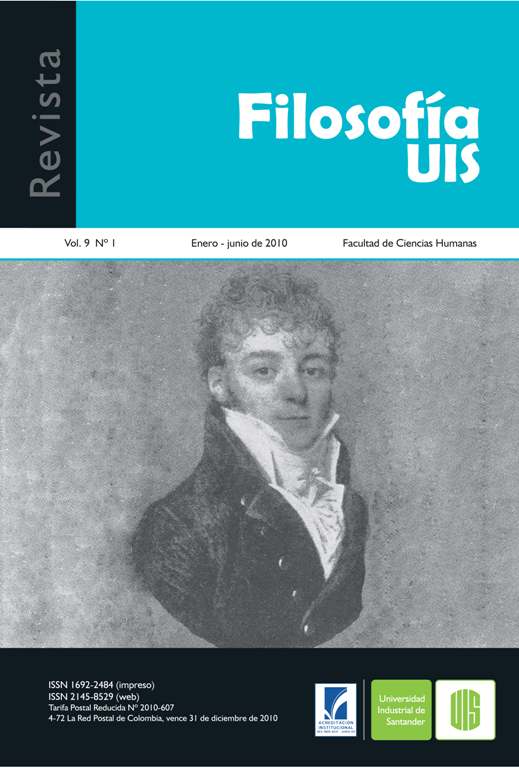Published 2010-07-27
Keywords
- french epistemology,
- interference,
- functor,
- ontology of difference,
- representation
How to Cite
Copyright (c) 2010 Fernando Martín Gallego

This work is licensed under a Creative Commons Attribution 4.0 International License.
Abstract
This article attempts to develop a systematic and comprehensive presentation of some major research advances made upon the project “The concept of science in Gilles Deleuze. Functors, references and partial observers” (PRI 09-033, FFyL, UBA, Argentina). The aim of, the article reviews successively: the place to be allocated to the scientific question within the Deleuzian work, the possible reasons that have tended to favor –in the field of specialized studies in philosophy of science– the neglect of its proposal, the precise parentage that can be attributed to its proposal in the context of the French epistemological tradition, and, the conception of philosophy of science and the scientific product that tends to follow from their investigations, as well.
Downloads
References
- Bachelard, Gastón (1972). La formación del espíritu científico, Buenos Aires: Siglo XXI.
- Bene, Carmelo y Deleuze, Gilles (2003). Superposiciones, Buenos Aires: Ediciones Artes del Sur.
- De Landa, Manuel (2002). Intensive Science and Virtual Philosophy, London & New York: Continuum.
- Deleuze, Gilles (1987). Foucault, Barcelona: Paidós.
- Deleuze, Gilles (1989). El pliegue. Leibniz y el barroco, Barcelona: Paidós
- Deleuze, Gilles (1994a). La imagen-movimiento. Estudios sobre cine 1, Barcelona: Paidós.
- Deleuze, Gilles (1994b). La lógica del sentido, Barcelona: Planeta-De Agostini.
- Deleuze, Gilles (1995). Proust y los signos, Barcelona: Anagrama.
- Deleuze, Gilles (1996a). El bergsonismo, Madrid: Cátedra.
- Deleuze, Gilles (1996b). Empirismo y subjetividad, Barcelona: Gedisa.
- Deleuze, Gilles (1996c). Spinoza y el problema de la expresión, Barcelona: Muchnik.
- Deleuze, Gilles (1997). La filosofía crítica de Kant, Madrid: Cátedra.
- Deleuze, Gilles (1998). Nietzsche y la filosofía, Barcelona: Anagrama.
- Deleuze, Gilles (2001). Presentación de Sacher-Masoch. Lo frío y lo cruel, Buenos Aires: Amorrortu.
- Deleuze, Gilles (2002). Francis Bacon. Lógica de la sensación, Madrid: Arena Libros.
- Deleuze, Gilles (2005). La imagen-tiempo. Estudios sobre cine 2, Buenos Aires: Paidós.
- Deleuze, Gilles (2006). Diferencia y repetición, Buenos Aires. Amorrortu.
- Deleuze, Gilles y Guattari, Félix (1995). ¿Qué es la filosofía?, Barcelona: Anagrama.
- Deleuze, Gilles y Guattari, Félix (1998). Kafka. Por una literatura menor, México,: Ediciones Era.
- Deleuze, Gilles y Guattari, Félix (2002). Mil Mesetas. Capitalismo y esquizofrenia, Valencia: Pre-textos.
- Deleuze, Gilles y Guattari, Félix (2007). El Antiedipo. Capitalismo y esquizofrenia, Buenos Aires: Paidós.
- Duffy, Simon (2006). Intensive Mathematics: The Logic of Difference, Manchester: Clinamen Press.
- Foucault, Michel y Deleuze, Gilles (2005), “Los intelectuales y el poder”, En: Deleuze, Gilles, La isla desierta y otros textos. Textos y entrevistas (1953-1974), Valencia: Pre-Textos.
- Gutting, Gary (2005). Continental Philosophy of Science, Oxford: Blackwell.
- Marks, John (2007). Deleuze & science, Columbia: Columbia University Press.
- Sokal, Alan y Bricmont, Jean (1999). Imposturas intelectuales, Barcelona: Paidós.
- Žižek, Slavoj (2006). Órganos sin cuerpos. Sobre Deleuze y consecuencias, Valencia: Pre-Textos.
